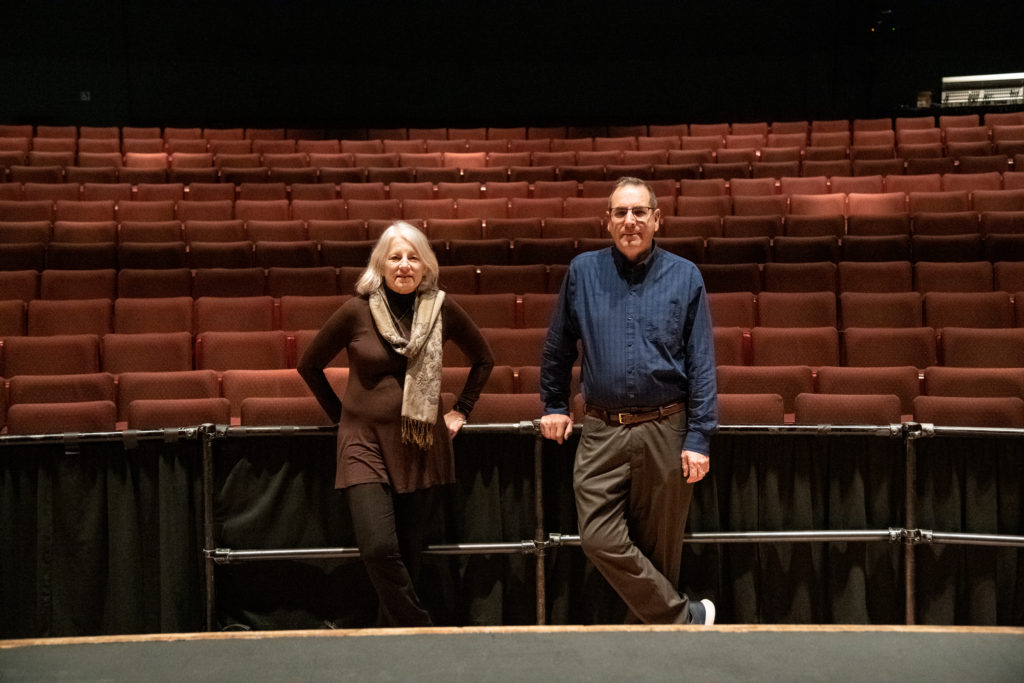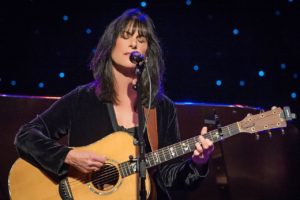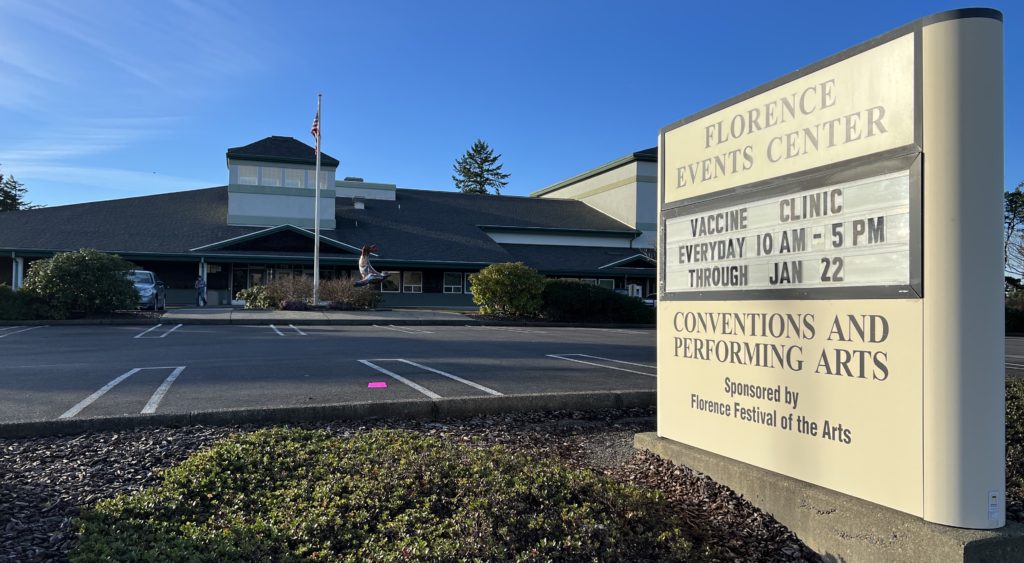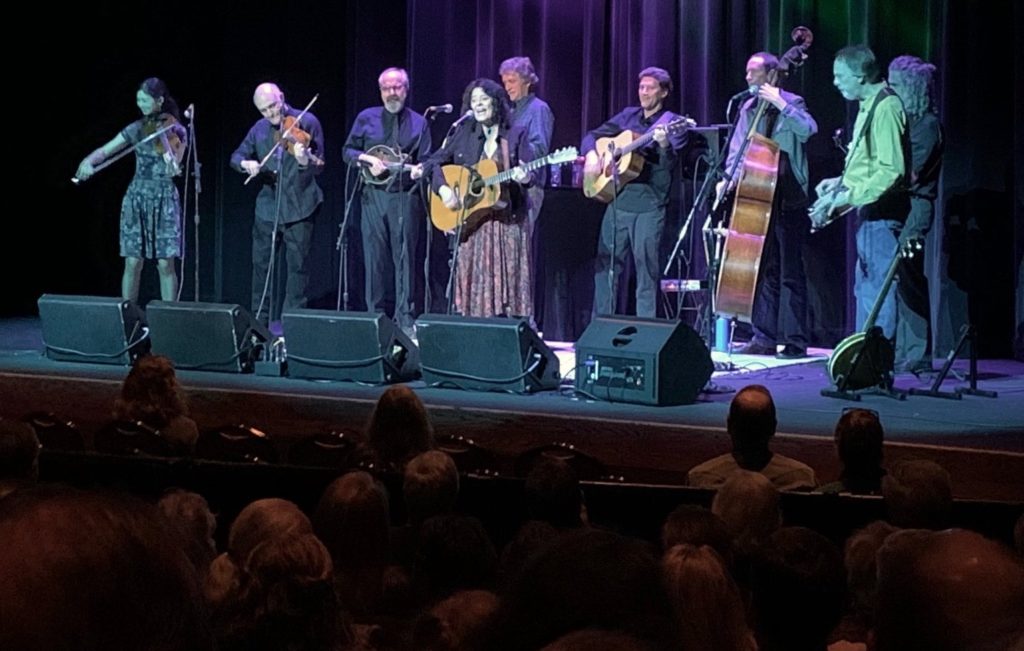
By JORDAN ESSOE/YachatsNews.com
FLORENCE — Undeterred by the surge of the Omicron variant, the Florence Events Center is ready to open its doors next weekend for the return of one of its marquee annual events, the Winter Music Festival.
During the year and a half closure due to the COVID-19 pandemic, the city-owned Florence Events Center had to skip commemorating its 25th anniversary last August. But it has been slowly staging more public events with a small book festival in September and a couple of successful holiday concerts and fundraiser in December.
Winter Music Festival organizers are optimistic about inviting the public back inside. But due to many factors related to the pandemic, the institution is in flux and looking for opportunities to reinvent some of its operations.
“We’re restarting,” said Megan Messmer, the Florence assistant city manager who stepped in to oversee the center in December 2020 after longtime director Kevin Rhodes resigned.
Rhodes took an early retirement after nine months of lockdown and presiding over an empty facility with no activities on the calendar and a furloughed support staff. He had been the director of the FEC for more than 24 years, joining the organization before the building opened in 1996.
“The change of management there is going to bring some changes in vision,” said Bettina Hannigan, executive director of the Florence Area Chamber of Commerce.
How broad and how quickly such changes may be implemented remains to be seen. There is currently no active search to find a new director and Messmer will continue in her temporary leadership role at least through the remainder of the fiscal year.

One thing that will be pleasingly familiar to loyal patrons is the highly anticipated return of the Winter Music Festival, which this year also serves as a kind of symbolic homecoming for Florence cultural life itself. The festival is Friday and Saturday, Jan. 28-29 with two full days of live music, jam sessions, workshops by festival artists, and a free community concert at Oregon Pacific Bank to kick everything off.
Divided between bluegrass music on Friday and Americana on Saturday, this year’s acts include festival veterans Kristen Grainger & True North, returning favorite and Portland-based Pretty Gritty, The Growling Old Men, Mary Flower, Friday’s headliner Appalachian Road Show, and Saturday’s headliner Karla Bonoff, a Grammy Award winner whose songs have been recorded by Bonnie Raitt, Wynonna Judd, and Linda Ronstadt.
Ticket prices range from $98 for a two-day pass to all shows to $49 for the Saturday night performance or $31 for Saturday afternoon.
The event was originally called the Winter Folk Festival until it was rebranded in 2016 to incorporate more diverse musical styles. The popular annual musical event is celebrating its 20th year, even though the 2022 event is only its 19th production because, of course, they had to cancel in 2021 because of the coronavirus pandemic.

Vaccines and omicron
Last year it looked like plans for the 2022 festival might also be in jeopardy, but it became possible to proceed once public health and safety guidelines relaxed after availability of the Covid-19 vaccine became widespread. Even so, vaccinations do not eliminate transmission and surging omicron cases in Oregon are expected to peak in late January – right at the time of the festival.
“We’re sitting on the edge of our chairs a little bit to see where this thing goes,” said Kirk Mlinek, the Winter Music Festival committee chair. Organizers are looking to the city, the state, and federal governments for guidance, and Mlinek admits the possibility that an unforeseen gubernatorial order could still be issued and make it impossible to hold a large public gathering.
“Is there some percentage chance this thing might not go at the end of January? I have to say yes, there is a chance that could happen,” said Mlinek. “But all systems are go right now and we’re selling tickets at a pretty good pace.”
Nationwide, other January cultural events are being rescheduled or moved exclusively online. The Sundance Film Festival has canceled all in-person aspects of its Jan. 20-30 event, as has the Slamdance Film Festival that follows it. The Grammy Awards have been postponed from their original Jan. 31 date. In Oregon, Broadway-type musicals are being offered to shoulder-to-shoulder audiences at the Hult Center for the Performing Arts in Eugene and in the Keller Auditorium in Portland.
To help accommodate cautious patrons, the Florence center has partnered with Portland-based Afton Tickets to offer a new option that will allow people to livestream the festival’s concerts from the safety and privacy of their home.
Despite being less expensive, however, streaming tickets aren’t yet finding much of an audience. Mlinek said the percentage of sales for livestream tickets was on the far right of the decimal point. He’s not surprised by that. Undoubtedly, the community has some fatigue from entertaining themselves at home.
The festival previously had expanded to three days. This year it runs for two days, a decision which Mlinek described as being a strategic move to help position the event for a successful turnout.
To attend the festival, people get a “wellness wristband” by showing proof of vaccination or a negative COVID-19 test within the previous 48 hours.
Masks will be required at all times, except in designated eating areas. Social distancing will be encouraged everywhere on the premises except in the theater itself, where there is no crowd capacity reduction. Workshops will be limited to 40 participants. There will be a nurse on site to answer questions.
Lodging tax support
While many privately-owned institutions suffered heavy financial losses during the lockdown, the Florence venue was able to stay financially afloat largely due to proceeds from the city’s lodging taxes. The events center also took measures to reduce overhead, such as furloughing staff, but also benefitted from a grant from the Oregon Cultural CARES Act that helped offset lost revenue, helped finance ticket refunds, and pay for safety upgrades to the building, such as new touch-free fixtures in its restrooms.
The building has also been used for mass vaccination clinics organized by the state and Lane County, including New Year’s Eve when people lined up outside not for entertainment, but for a Covid-19 shot. Now, the center is being used as one of the Oregon Health Authority’s mass clinics right up until the date organizers of the Winter Music Festival begin unloading their equipment.

Performing groups struggle
Of the local organizations that did not survive the pandemic is SEAcoast Entertainment Association, which has had the most salient impact on the future of the events center. The all-volunteer nonprofit was responsible for bringing live entertainment to Florence for 40 years, delivering an average of eight programs of mostly classical and popular music a year. Their board of directors voted to cease operations last September, creating a void in the cultural programming landscape that Mlinek described as “a kick in the shins.”
The center has always relied heavily on volunteer groups such as SEAcoast to fill the lion’s share of its public events calendar. In its absence, the center will have to begin producing more shows themselves or turn to organizations such as Florence Arts, Culture & Entertainment, which is producing the Winter Music Festival, to deliver even more content.
The Florence group has worked hand-in-hand with the center since its inception, mostly as a sponsor to help other nonprofits bring their work to the stage. But it is unclear if they alone are in a position to fill the large vacuum left by SEAcoast’s closure.
Aleia Bailey, the center’s acting operations manager, says they are excited by the opportunity to produce more events themselves.
SEAcoast left half of its remaining assets to the Children’s Repertory of Oregon Workshops (C.R.O.W.), which traditionally puts on a high caliber Broadway-style show at the events center every April. After cancelling their 2020 production of “Mary Poppins,” they also shelved their plans for an ambitious 2022 “Cinderella” show.
“We switched to a concert style of Disney’s ‘Frozen Jr.,’ a little shorter and a little simplified,” said Melanie Heard, C.R.O.W.’s artistic director, board president and founder. They are currently casting that production, and plan to stage it April 22-24.
While the center was closed, C.R.O.W. was creative in the ways they tried to let the community know they were still active and present, including window displays and radio theater. They continued to accept donations and help from sponsors, but without the Covid relief grants they received, Heard does not think they would have survived.
“We need a theater,” said Heard. “We need the FEC.”
Without access to the events center, the local theater group The Last Resort Players also remained closed during most of the lockdown, but eventually delivered four small sold out performances of The Vagina Monologues in August 2021 at City Lights Cinema. They will be returning to the events center in March with a modest production of “John & Jen” with hopes that a new, full production can be undertaken in the fall.
The events center is an extraordinary asset to Florence, particularly its 455-seat professional proscenium style theater, which is rare for a town of Florence’s size. Many people involved in the cultural landscape of the area, including Mlinek, Heard, and The Last Resort Players president Jim Wellington, moved here specifically because of it.
“We’re hopeful that the lights are going to stay on,” said Mlinek.
He predicts they will have a successful music festival, get through omicron, and their patrons will come back to “whatever that new normal looks like.”
“There are a lot of other places you can go, but this is the one that has to take everybody. It’s owned by the city, and it’s open to everyone,” said Rachel Pearson, the president of Florence Arts, Culture and Entertainment group. “It’s our gathering place.”
- Jordan Essoe is a Waldport-based freelance writer who can be reached at alseajournal@gmail.com


